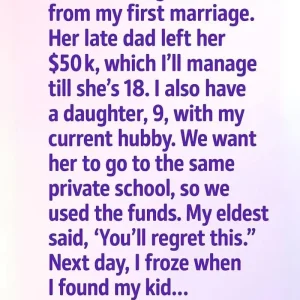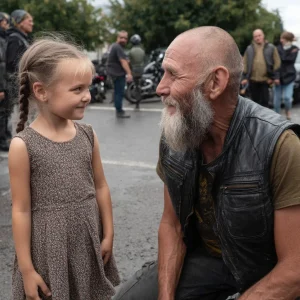The night in Connecticut was still, broken only by the distant hum of cars along I-95. Laura Mitchell sat alone in her living room, fingers clenched around a cup of tea gone cold. Hours had passed without a word from her husband, Daniel. He’d promised to be home by seven after a meeting, but by midnight, ten unanswered calls had left Laura’s chest tight with dread.
The silence in the house pressed in on her like a weight.
At 2 a.m., the phone finally rang. Not Daniel. The state police. The officer’s tone was flat, practiced, almost sterile. “Mrs. Mitchell, your husband’s car was found wrecked by the river. No body recovered, but… the signs suggest he didn’t make it.”
The cup slipped from her grasp, shattering against the hardwood. No body? Likely didn’t survive? Grief came in jagged waves – sh0ck, rage, numbness. For days, Laura’s home transformed into a shrine of memories: unopened casseroles filled the fridge, voicemails stacked with condolences. She walked through her days like a shadow of herself.
Then, cracks appeared.
While sorting Daniel’s paperwork for the insurance claim, Laura explored a motel receipt. The date? Two days after his supposed d3ath. Signed in his unmistakable handwriting. Her heart hammered. A mistake? She wanted to believe so. But deep down, a dark certainty rose: Daniel wasn’t gone. He was in hiding.
More signs surfaced. Withdrawals from ATMs miles away. A neighbor insisting they’d spotted his car. Piece by piece, the truth hit: Daniel had staged his own death.
Why? And what was she supposed to do now?
Grief hardened into resolve. Laura wouldn’t crumble. If Daniel thought he could vanish and leave her broken, he had underestimated her.
She started to trace his trail. The Newark motel clerk reluctantly admitted that a man matching Daniel’s description had paid cash, stayed two nights, and asked about buses heading south. Laura followed every lead, mapping routes, pulling threads until the web emerged.
Her breakthrough came with their shared credit account. Sloppy mistake—he’d rented a storage unit in Baltimore under the alias David Monroe. Inside: stacks of cash, burner phones, forged IDs. Proof that he’d been planning this escape for years.
The betrayal seared her. Every late night, every sacrifice she’d made, every dream they’d shared—it had all been smoke. This wasn’t just abandonment. It was fraud. If she filed for life insurance while knowing he lived, she’d be complicit. He’d left her trapped between ruin and crime.
Instead of running to the police, Laura called in a favor. A retired cop turned private investigator tracked Daniel to Charleston, South Carolina.
When Laura arrived, she saw him. Alive. Leaner, darker, laughing with strangers at a marina as if the life they built together had never existed.
That night, staring at her reflection in a hotel mirror, she made her choice. Walk away—or confront him.
She knocked on his apartment door. Daniel opened it, towel around his neck, face draining of color when he saw her. “Laura…”
“Surprise,” she said coldly, stepping inside. The air reeked of cheap whiskey.
He mumbled excuses—debts, men chasing him—but Laura knew better. He wasn’t escaping danger. He was running from responsibility, from his gambling losses and double life.
From her bag, she laid out photos: the storage unit, the fake IDs, the cash. His face went chalk white.
“You thought you buried me in grief,” Laura said, voice like steel. “But you forgot—I’m still alive. And now, so are you. Which means it’s over.”
By morning, Daniel was in handcuffs. Fraud, false d3ath, identity theft—it all unraveled.
News spread fast: “Connecticut Man Fakes Death—Wife Outsmarts Him.” But the real shock came after. Laura didn’t shrink into shame. She rose. Writing a memoir, speaking at women’s conferences, turning betrayal into a platform.
Her name became a symbol of resilience. Not the widow of a coward—but the woman who refused to be deceived.
And Daniel? Just another inmate with a failed scheme.
Standing on a stage months later, Laura told a packed room: “Sometimes those closest to you script your tragedy. But you get to decide if it stays tragedy—or becomes triumph.”
The applause thundered.
Laura Mitchell smiled, finally free.





